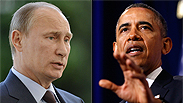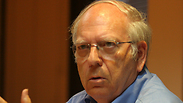
'Israel is extra careful about Putin's honor, but constantly lashes out at Obama'
Photos: AFP, Reuters

Efraim Halevy
Photo: Gilad Kavalerchik
The worsening international crisis over the Ukraine issue
and the renewed negotiations
between Iran and the five permanent Security Council members and Germany are presenting new challenges and real dilemmas for Israel's foreign and defense policy.
It's easy to assume that had the American deputy foreign minister announced that in order to reduce the friction with Russia on the Ukrainian issue his country would consider moving towards Russia's policy on Iran, such an announcement would have taken center stage in the Israeli press' headlines, and public figures and columnists would have competed amongst themselves on who would better condemn the thought that the US is considering including the Iranian nuclear issue in the intra-power trade-in cauldron.
The Russian deputy foreign minister stated in recent days that if the G7 nations would expand their punitive measures against Russia, it would consider changing its policy towards Iran on the nuclear issue. On the day the talks between the six countries and Iran were resumed, Russia announced its plan to build two additional nuclear reactors in Iran. Even if they are intended for purely civilian purposes, one cannot ignore the announcement's timing.
Mother Russia
Elyakim Haetzni
Op-ed: Our relationship with Russia is not perfect, but Putin combats anti-Semitism, has kept his promise not to complete delivery of anti-aircraft systems to Iran and Syria.
The senior ministers and leading commentators would likely take out from their closet of statements the most polished articles criticizing Obama the man and his failed policy. Once again they would tell us that at the end of the day, Israel is all alone in its battle.
Nor can we ignore the Russian-Syrian context of the Ukrainian affair. President Putin and his spokespersons stress that returning the Crimea peninsula to Russia's sovereignty is also aimed at defending the Russian population in this strategic area. Russia sees itself responsible for the fate of the Russian diaspora in central and eastern Europe. The more the civil war in Syria expands and goes on, especially if an extreme turnabout takes place against President Assad and the Alawi faction, it may raise questions not only about the fate of the great Russian investment in the current regime's defense establishment, but also about the issue of the tens of thousands of Russian citizens living in Syria. How will Russia protect them?
A large amount of high-quality Russian weapons continue to flow into Syria, and some of them, according to both foreign and non-foreign sources, are directed towards Hezbollah.
The Israeli public is unaware of the nature of the discourse between Jerusalem and Moscow and of the understandings, if there are any, which have been achieved in this discourse on the highest levels. What should be noted is that Israel's most articulate spokespersons have sentenced themselves to complete silence over the issue, and this discipline is being kept in an unusually meticulous manner by the senior and less senior commentators in the Israeli media.
Iranians taking pleasure
The reasons for the contradictions between the way Israel is constantly extra careful about Russia's (and China's) honor and the apparently irresistible need in Jerusalem to lash out at the US, its president, its secretary of state, the gutless and weak negotiators, may be revealed some day.These days, Israel is not limiting its mocking criticism against Washington and its Middle Eastern policy: While Russia is described as a resolved, brave country engaging in a smart, shrewd and winning policy – the US is presented as hesitant, afraid, powerless, and therefore defeated.
The Iranians can take pleasure in seeing America's ally declare on a daily basis with hysterical cries of despair that Washington is going from bad to worse. It's safe to assume that Putin is finding this situation convenient and desirable as well, as he is enjoying both worlds in the Middle East – one which is his ally, and the other which is careful not to publicly offend his honor and status.
The US president must envy his Russian rival for the respect he receives in Israel as opposed to the daily dose of scorn and alienation served to our "ally" time and again. As the public has no knowledge about the reason for the echoing silence in Israel over Russian's policy in the region as opposed to the frequent criticism directed at the US, we should only hope that the people up there know some things that we don't. I have my doubts.
Efraim Halevy is a former head of Mossad















